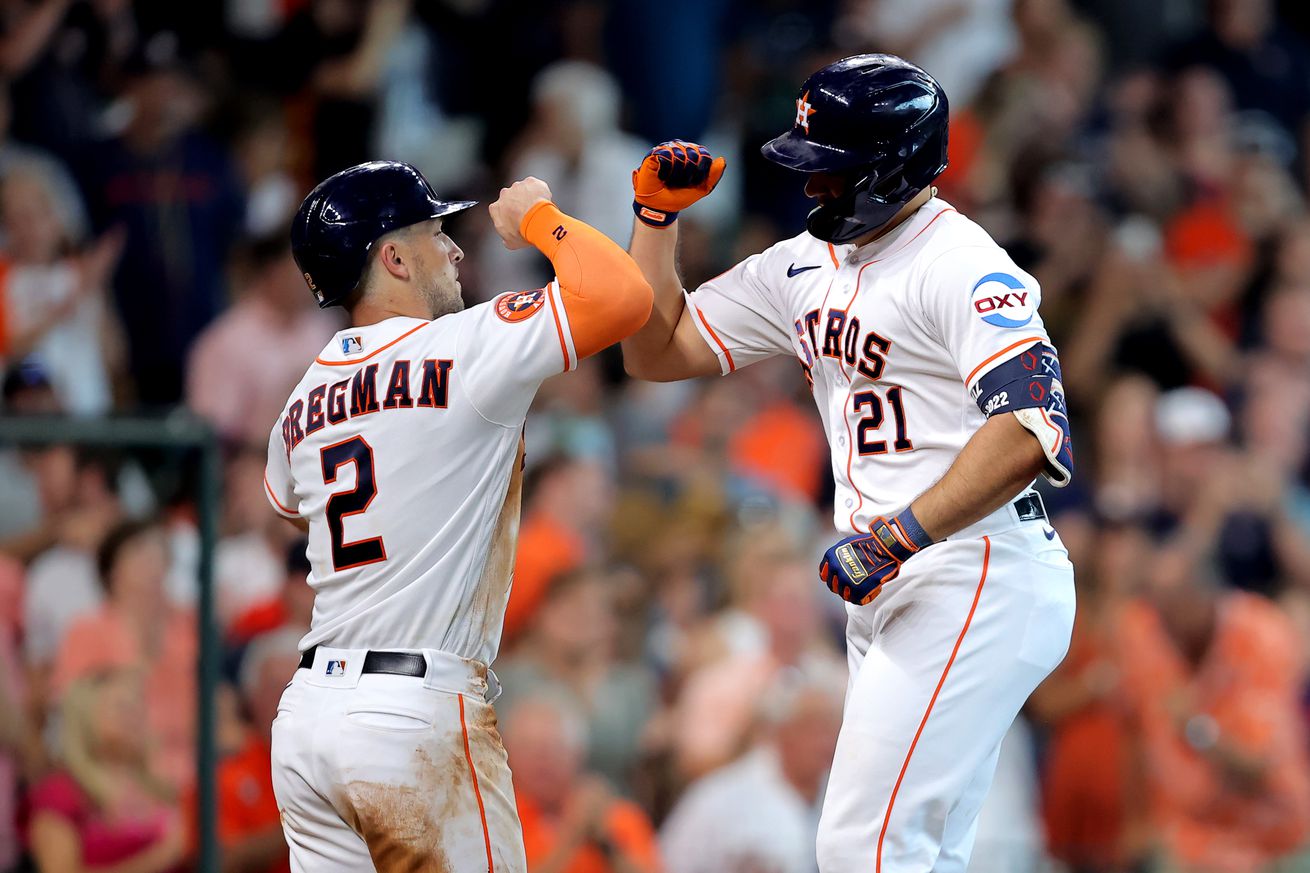
For the second time this week, I am delaying my Cristian Javier follow-up post. It isn’t necessarily about not having it ready. My research, more or less, is complete. All that remains is a bit of formatting and copying it over to the portal that we use when publishing here at TCB. Rather, the delay this time is due to a bit of roster news that occurred on Thursday’s off-day, which riled me up a bit if it means what I think it does.
The Astros are calling up Bligh Madris to take César Salazar’s spot on the 26-man roster, sources tell @TheAthletic. Madris is not on the 40-man, which is full, so there will be a move tomorrow to clear a spot.
— Chandler Rome (@Chandler_Rome) June 22, 2023
On the surface, the roster move itself appears innocuous. The Astros, after all, haven’t utilized César Salazar in a meaningful way, and Bligh Madris is a left-handed bat with some experience at first base. Even with a mild resurgence earlier this month, José Abreu remains a liability at the plate, regardless of the handedness of the pitcher. But his current struggles against right-handers are even more prominent than those against left-handers.
- vs. LHP: .215/.289/.354, 18.9% K%, 10% BB%, 75 wRC+
- vs. RHP: .228/.275/.289, 27% K%, 4.7% BB%, 58 wRC+
On paper, the decision to call up Madris makes sense, at least for the interim with the dearth of left-handed hitters on the active roster. Considering how Dusty Baker has deployed his bench this season, however, I don’t expect Madris to start over Abreu to any meaningful extent. Madris’ role is likely designed to provide a left-handed bat off the bench, especially in a pinch-hit situation. But the decision to option Salazar does create another issue — intentional or not — and one that has become an increasingly sensitive topic throughout the season: Playing time for Yainer Díaz.
Since Yordan Alvarez’s oblique injury, the premium on runs has only grown. I mean, the Astros were a hair below average by wRC+ (99) with Alvarez in the lineup. Ironically, without Alvarez now for most of June, the Astros have actually hit a little better than league-average (103 wRC+) since his injury. It is foolish, though, to expect the lineup to produce at that rate without one of the best hitters in the game, but Díaz’s performance is a key reason why the offense hasn’t tanked as evidenced by his numbers in June (.333/.339/.684, 5 HR, 177 wRC+ in 59 plate appearances). While there are some valid concerns about Díaz’s plate discipline (1.7% walk rate compared to a 16.9% strikeout rate), the rookie slugger has only impressed with consistent playing time. The fact that he only appeared in a combined 22 games prior to June remains baffling.
For better or worse, the Astros appear content with Martín Maldonado being the primary catcher. Only five catchers have caught more innings than Maldonado this season (. Of those five, Jonah Heim, J.T. Realmuto, and Elias Diaz are having above-average seasons at the plate with the remaining two (Keibert Ruiz and Shea Langeliers) hitting below-average, albeit they were top prospects at their position as recently as 2021 now playing for rebuilding clubs. But catcher value isn’t exclusively tied to offensive numbers. Heck, even the defensive metrics we have now don’t capture everything a catcher does. The Astros value Maldonado highly due to the intangibles he brings to the club. It is debatable how important those unknown contributions are compared to what we can actually measure. I’d venture to speculate that the Astros are one of the few clubs who would give Maldonado this much time as the primary option with his current offensive output. In any case, there is certainly room for debate about how much Maldonado should play, especially with the emergence of Díaz.
At this juncture of the season, trailing the Rangers by multiple games and trying to compete with the Angels, the Astros aren’t in a position to become too stubborn about roles. Embrace flexibility, I say. I understand that a player knowing his role is important and all of that organizational team-building stuff. It is a similar methodology that you hear in other industries. All I am suggesting is that the organization ought to become a bit more flexible. Frankly, there are zero reasons why Díaz’s bat should be kept on the bench for most games. Or any games, for that matter. The Astros are a better team right now when Díaz is hitting, whether at catcher, first base, or designated hitter. But optioning Salazar back to Triple-A leaves only two catchers on the active roster, and, up to this point, it doesn’t appear as if Maldonado’s playing time will decrease. But in order to avoid an uncomfortable situation, Díaz’s playing time will likely decrease to keep a backup catcher available in the event he is needed.
Dusty Baker has more baseball knowledge in his right pinky than I possess in my entire being. I think he has been above average in managing this team for the past three seasons. That said, it is fair to question the decisions being made. Sacrificing more offense when your best hitter is already out is extremely aggravating. Unlike past seasons, Houston doesn’t have much margin for error, if any as we approach the mathematical midpoint of the season. Díaz’s production in June simply warrants more playing time, not less.